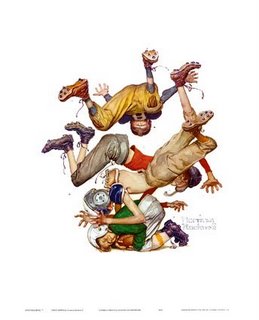Montessori Monday: Discipline
Monday, January 29, 2007
 Or, Don't These Desks Come with Shackles?
Or, Don't These Desks Come with Shackles?A frequently misunderstood principle of the Montessori method is discipline. Many people, after hearing a brief overview of her methods, or seeing a "Montessori-inspired" school (as opposed to one that only employs certified Montessori teachers), jump to the conclusion that Maria Montessori was all about letting kids do whatever they want, when they want.
Critics hear the phrase "liberty of the child" and alarm bells ring so loudly in their minds they never hear the rest of the sentence.

First, one needs to remember that Dr. Montessori developed her methods at the turn of the 20th century, in the poorest of poor neighborhoods in Italy. Not exactly a time and place conducive to a happy childhood. It was not a time when child development with black and white toys and classical music boxes played in utero were common place; children were to be seen and not heard, education, should it occur at all (this was before free, public schools in that country), was generally force feeding of dry facts to memorize and a student should have no opinion on anything at any time. It was not a happy, fuzzy trip to the elementary school in which children would have a tough decision whether to use the sand or the water table that day.
I think the words of Maria Montessori herself will help dispel any notions of a chaotic free-for-all in the early education classroom:
"...Liberty is activity. Discipline must come through liberty. Here is a great principle which is difficult for followers of common-school methods to understand. How shall one obtain discipline in a class of free children? Certainly in our system, we have a concept of discipline very different from that commonly accepted. If discipline is founded upon liberty, the discipline itself must necessarily be active. We do not consider an individual disciplined only when he has been rendered as artificially silent as a mute and as immovable as a paralytic. He is an individual annihilated, not disciplined.
We call an individual disciplined when he is master of himself, and can, therefore, regulate his own conduct wehn it shall be necessary to follow some rule of life."
- Maria Montessori, The Montessori Method
In short, just as Dr. Montessori advocated education for life, she advocated discipline for life as well. She envisioned a school where children were taught to move, rather than sit still (that is, to move without making undue noise, without disturbing others, with purposeful and useful movements).
The children are free because they are disciplined - not just when Teacher is around, but a self discipline they can take with them to many different situations.
Montessori never advocated letting a child do as he pleases - he must be taught self discipline in a loving environment:
The liberty of the child should have as its limit the collective interest...We must, therefore, check in the child whatever offends or annoys others, or whatever tends toward rough or ill-bred acts.

"...avoid the arrest of spontaneous movements and the imposition of arbitrary tasks. It is understood that here we do not speak of useless or dangerous acts, for these must be suppressed, destroyed."
- Maria Montessori, The Montessori Method
The liberty of the child lies in allowing him to decide his activities, and to allow him to work on an activity for as long as he feels necessary. He should be uninterrupted, and not forced to complete a work if he stops without finishing every part of the work.
(Note: I refer here to "work", and "works". These are the tools that a child uses in his learning, and activities to master. You'd probably call most of them toys or manipulatives. My daughter's blocks are her works, as well as her pegboard, baby doll, pouring exercise, broom, puzzle... she spends her morning doing her work, and I do mine. The concept of "work" vs. "play" is worthy of another post, so I won't go into detail here.)
The death of liberty in the Montessori classroom is to arbitrarily require a child to stop his work, to break his attention, and to call him to complete a series of useless tasks. (Ever read Holes, where the children are forced to dig a hole and fill it in?) A famous hallmark of the Montessori system is the Three Hour Work Period - children are allowed to pursue spontaneous education for three hours, without being required to attend a class, stop their work because it is convenient for the teacher to take them to the bathroom, or so on. In a way, they are at their leisure in pursuing educational activities... which brings us to the Prepared Environment.
I'll be posting on the Prepared Environment in the future, and I would like to call for pictures of your Montessori environment if you have them to publish with that post! So please e-mail me:
mommyjo2(at)yahoo(dot)com. Or even your schoolroom/kids area in your home!
Read Dr. Montessori's Own Handbook, digitized by Google!
posted by Milehimama @ Mama Says at 1/29/2007 08:30:00 AM | Permalink |
|








